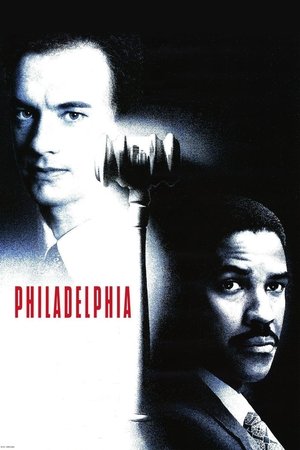
Philadelphia
**A dense, disturbing, difficult, but highly relevant film.** Well, those who has the patience and charity to read what I write may have already realized that I'm not a big fan of overly militant films, even if they are causes or ideas that I defend or with which I tend to agree. For me, cinema is above all entertainment and artistic expression, not a political, social or belief manifesto. However, it is really difficult not to make an exception when it comes to discrimination against people in the workplace. I know what my friendly reader is probably thinking: the film isn't about that, it's about AIDS. It is true. But AIDS is a pretext to justify what happens to that man. He is discriminated against and loses his job for being homosexual. I won't waste a lot of time explaining what happens in the film. It's relatively old and almost everyone has seen it at least once: Andrew Beckett is a young lawyer with a promising future until he discovers that he has contracted AIDS in a casual sexual encounter with another man. The disease becomes increasingly obvious to his bosses, and he ends up being fired, which is why he decides to sue the firm, arguing that the real motivation for the dismissal was their prejudice regarding his (discrete) homosexuality, which the disease denounced. The film is excellent and, at the time, did a lot to demystify AIDS, a disease about which there was little general knowledge and which many people feared because it was not very evident how it was spread. Nowadays, with more information and public knowledge, these myths have disappeared, but that does not prevent the disease from being one of the most feared, along with cancer or leukemia. However, the film was not able to detach AIDS from homosexuality. I understand this: a disease like this spreads easily in social environments where sexual behavior is more liberal, and we know that a good part of GLBT's do not have very stable relationships. But the truth is that we, today, know very well that AIDS can perfectly be contracted by heterosexuals who do not have the good sense to protect themselves. In fact, I tend to associate AIDS more with drug users, due to the enormous risk they run when consuming drugs in filthy environments and sharing needles with each other. In addition to the film having a highly pertinent and heavy theme, which guarantees it a relevance and importance that it would otherwise never have, there is another reason this film is a success and has enormous repercussions: Tom Hanks. This is definitely the film that opened the horizons of his career, contributing decisively to making him one of the most beloved actors in the USA. He was still young here, he was coming out of a phase where he did a lot of quality comedies and the film was an opportunity to show his serious and dramatic side. Needless to say, the actor took advantage of every second and gave us one of the most significant works of his career, in a brutal odyssey that earned him the Oscar for Best Actor, a feat he scored twice the following year, with “Forrest Gump”. Remarkable! Next to him, an energetic Denzel Washington, who just doesn't get duller and warmer because the actor's devastating charisma doesn't allow it... and it's not easy to put Denzel out of the limelight! It's not a film that I feel deserves high marks on the more technical points. Johathan Demme, the director, had the good sense not to mask the film under tons of visual and sound gimmicks that the film did not require. It's a clean, smooth film, with a speech as direct as a punch in the audience's stomach. And believe me, it's one of those films that is difficult to watch, that makes you think and that doesn't make you happy at all. In any case, the cinematography, sets and costumes do a good job, and the courtroom scenes (a real room that was used for the film) are worth it for their realism. And if it is true that Bruce Springsteen rightly deserved the Oscar for the Original Song “Streets of Philadelphia” (which we hear practically in its entirety, during a long opening credits sequence), one of the singer’s greatest hits, I must also point out the opera arias used in the film, which are mostly recordings of the eternal diva Maria Callas in various operas such as “Adriana Lecouvreur”, “La Vestale” or “Andrea Chénier”. The contrast between the rawness of the film and its themes with the sublime beauty and lyricism of these melodies could not be more disconcerting.
